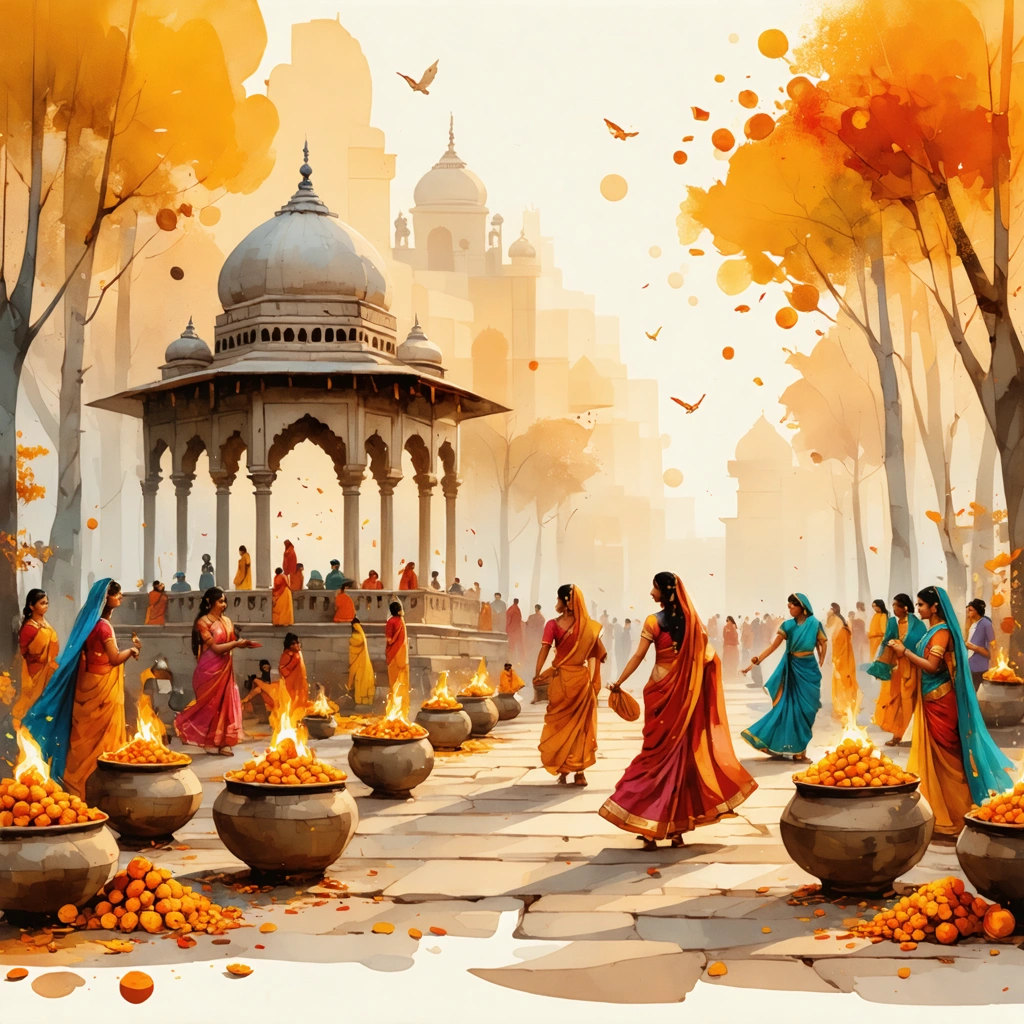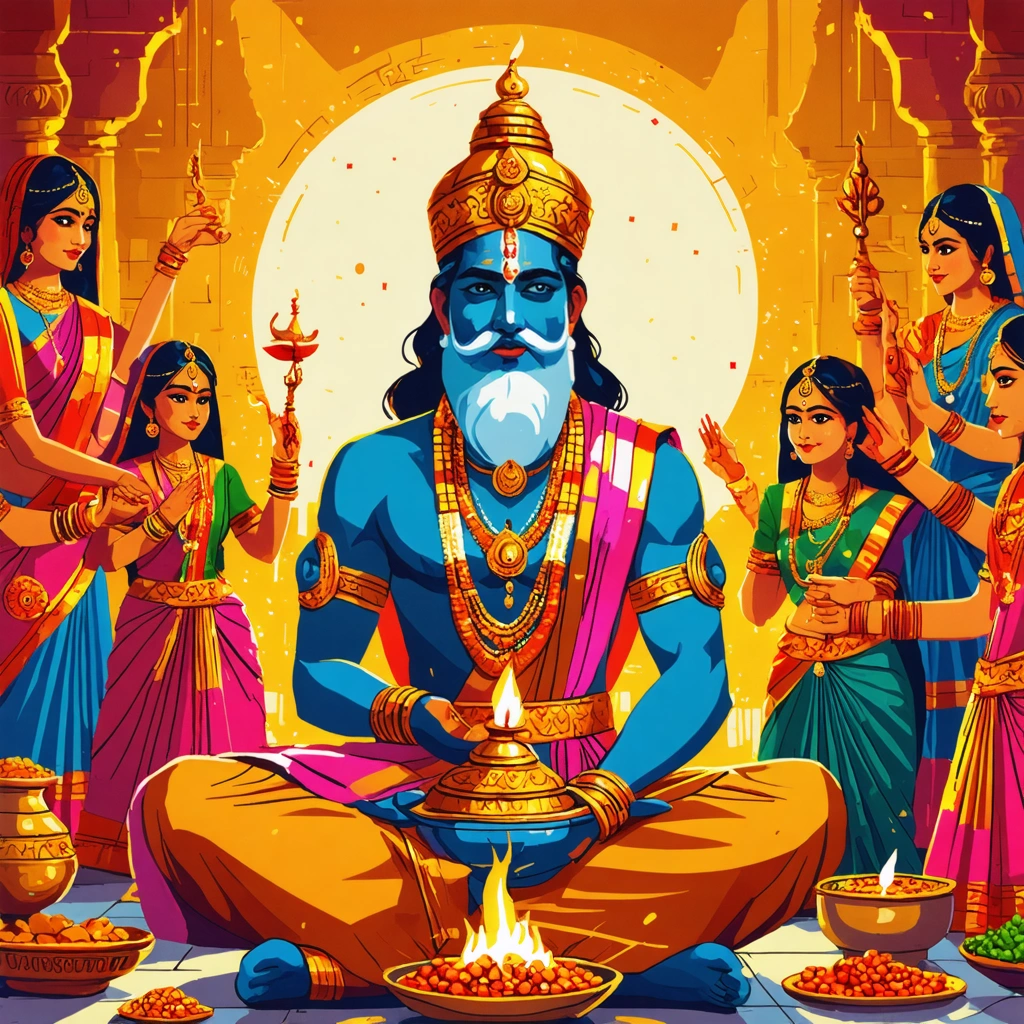
Unraveling the Mystique of India’s Celebrations
India’s festivals are not just dates on a calendar; they are vibrant tapestries woven with centuries-old rituals, cultural stories, and a collective spirit that unites millions. Yet, for many, the sheer diversity of these celebrations can feel overwhelming. When exactly is Vishwakarma Puja Kab Hai? What’s the essence of the Karwa Chauth Katha? And how do families across the country mark Raksha Bandhan Kab Hai? These questions often arise, especially in a rapidly modernizing world where the ancient blends with the contemporary in fascinating ways.
Imagine waking up on a crisp autumn morning, the air filled with the scent of marigold flowers and incense. Neighbors gather, dressed in traditional attire, preparing to honor Vishwakarma, the divine architect and craftsman. But how many really understand the profound significance behind this day? Or picture the quiet intensity of Karwa Chauth — women fasting with devotion, their hearts brimming with love and hope, as the Karwa Chauth Katha unfolds, revealing layers of faith and folklore. And then there’s Raksha Bandhan, a festival that celebrates the sacred bond between siblings, yet its customs vary subtly across regions, making the question of Raksha Bandhan Kab Hai something that connects families nationwide in anticipation.
Why Understanding Festival Traditions Matters More Than Ever
In an age where social media often reduces festivals to colorful photos and trending hashtags, the deeper meanings behind these rituals risk fading into the background. This disconnect can leave many feeling out of touch with their cultural roots or unsure about how to genuinely participate. It’s not just about knowing the dates; it’s about grasping the stories, the rituals, and the emotions that breathe life into these celebrations.
Consider this: India is home to over 1.3 billion people, and its festivals represent a kaleidoscope of languages, religions, and customs. When someone asks, “Vishwakarma Puja Kab Hai?” it’s not merely a query about timing, but an entry point into understanding the reverence for craftsmanship and labor. Similarly, the Karwa Chauth Katha is more than a tale read aloud; it encapsulates ideals of love, sacrifice, and marital fidelity. And Raksha Bandhan? It’s a day that transcends the simple act of tying a rakhi, symbolizing protection and lifelong commitment between siblings.
Bringing Festivals to Life in 2025
This year, as India navigates the complexities of the 21st century, these festivals continue to serve as anchors of identity and community. Whether you’re someone eager to reconnect with your heritage, a curious observer wanting to understand the cultural mosaic, or a family looking to enrich your celebrations, knowing the “whens” alongside the “whys” brings meaning that resonates far beyond the festivities themselves.
In the following sections, we will explore some of India’s most cherished festivals, delving into their unique rituals, historical significance, and the heartfelt stories behind them. From the precise timing of Vishwakarma Puja Kab Hai to the enchanting narratives in the Karwa Chauth Katha, and the joyous anticipation surrounding Raksha Bandhan Kab Hai, this guide promises a thorough and engaging journey through India’s festive traditions in 2025.
Get ready to unlock the magic, understand the customs, and perhaps discover a few new reasons to celebrate these timeless festivals with renewed passion.

Festival Traditions in India: Dive into the Rituals That Define India’s Festive Spirit in 2025
India’s rich cultural fabric is woven with countless festivals celebrated with fervor and devotion. Each festival carries unique rituals and traditions that reflect the country's diverse heritage, spirituality, and social values. As we look ahead to 2025, understanding these festival traditions not only enriches cultural appreciation but also provides insight into the social and religious ethos of India.
What Are the Key Festival Traditions in India in 2025?
India’s festival calendar is packed with vibrant celebrations throughout the year, from Hindu religious ceremonies to regional fairs. Some of the most iconic festival rituals include lighting diyas during Diwali, fasting during Karwa Chauth, tying rakhi on Raksha Bandhan, and worshipping tools and machinery on Vishwakarma Puja. These rituals are more than symbolic acts; they foster community bonding, express gratitude, and uphold traditions passed down through generations.
Understanding the Rituals of Vishwakarma Puja
One festival gaining increasing attention in the modern era is Vishwakarma Puja, dedicated to Lord Vishwakarma, the divine architect and craftsman. This puja is especially important for workers in engineering, manufacturing, and craftsmanship sectors.
Vishwakarma Puja Kab Hai in 2025? The festival typically falls in September, on the 17th day of the Hindu month of Bhadrapada. In 2025, Vishwakarma Puja is observed on September 17th.
On this day, workers worship their tools, machinery, and vehicles, seeking blessings for safety and productivity. Factories and workshops are often closed to honor this tradition, reflecting the deep respect for craftsmanship and labor in Indian culture.
The Significance and Rituals of Karwa Chauth
Karwa Chauth is a widely celebrated festival among married Hindu women who fast from sunrise to moonrise for the well-being and longevity of their husbands. The rituals are deeply symbolic and rooted in devotion and love.
The festival begins with women dressing in traditional attire and applying henna on their hands. The Karwa Chauth Katha is an essential component, where elders narrate the mythological stories behind the fast, explaining its origins and significance. This storytelling fosters a sense of community and cultural continuity.
The fast is broken only after sighting the moon and performing the puja, highlighting themes of patience, faith, and marital harmony.
When Is Raksha Bandhan Celebrated in 2025 and What Does It Symbolize?
Raksha Bandhan Kab Hai in 2025? This festival, celebrating the bond between brothers and sisters, will be observed on August 19th, 2025.
On Raksha Bandhan, sisters tie a protective thread called a rakhi on their brothers' wrists, symbolizing love and protection. In return, brothers give gifts and vow to protect their sisters. This simple yet profound ritual strengthens familial bonds and reaffirms mutual respect.
The festival transcends biological relationships, often extending to close friends and community members, emphasizing unity and social cohesion.
Why Are These Festival Traditions Important?
Festival rituals in India serve multiple purposes:
- Cultural Preservation: They maintain ancient customs and transmit values to future generations.
- Social Bonding: Festivals bring communities together, fostering harmony and collective identity.
- Spiritual Renewal: They offer moments for reflection, gratitude, and renewal of faith.
- Economic Impact: Festivals drive local economies through markets, tourism, and artisanal crafts.
For example, the economic surge during Diwali and Raksha Bandhan boosts sectors like retail, sweets manufacturing, and gift industries, highlighting the intertwining of tradition and modern commerce.
How to Experience and Respect Indian Festival Traditions in 2025?
Whether you are a local or a visitor, immersing yourself in Indian festivals requires understanding and respect. Here are some tips:
- Learn about the historical and spiritual background of the festival.
- Participate in community events and listen to elders narrate traditional stories, such as the Karwa Chauth Katha.
- Respect local customs, dress codes, and rituals during celebrations.
- Support local artisans and vendors who contribute to the festive economy.
By embracing these traditions thoughtfully, you can experience the true spirit of India’s festivals in 2025.
Conclusion
India’s festival traditions, rich in symbolism and community spirit, offer a window into the country’s diverse cultural identity. Knowing details like Vishwakarma Puja Kab Hai, the essence of the Karwa Chauth Katha, and the date of Raksha Bandhan Kab Hai in 2025 allows for deeper engagement with these celebrations. As India moves forward, these festivals continue to define its festive spirit, connecting past with present and individuals with their communities.


